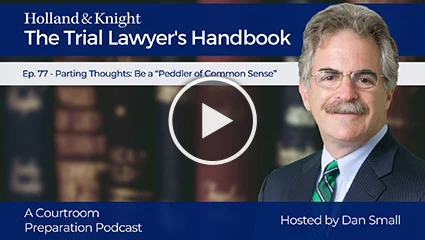Dan Small: The frequently stated rule is that an opening statement is intended to be only a summary of the facts, and that argument in openings is not permitted. But like a lot of rules, just saying it frequently doesn't make it clear or understandable. In fact, the distinction between facts and argument is difficult for many lawyers, especially new lawyers. This is probably because, number one, there is no clear boundary between facts and argument, and number two, the prohibition against argument is rarely strictly enforced. Most judges would say that the facts are what the evidence is expected to show. Well, that's great. Argument, at least in this context, is a drawing of conclusions from those facts and attempting to persuade the fact finder that those conclusions are correct. But we use facts in order to convince, and it's often hard to tell the boundary between a mere recitation of the facts and forbidden argument.
Consider the following types of statements, all of which may appear in an opening.
- Statements of fact: Snow fell that night.
- Reasonable inferences from the facts: There were footprints in the snow, showing that a man had walked across the yard.
- Statements concerning the absence of facts: No witness will testify that Mr. Jones was anywhere near the scene of the robbery.
- Statements concerning competing versions of the facts: Mr. Smith's version of the events is contradicted by every other witness who was present.
- How about statements concerning the credibility of a fact witness? Mr. Jones is not telling the truth about the accident.
- Statements concerning the weight or sufficiency of the facts: There is overwhelming evidence that he pulled the trigger.
- Statements applying the facts to reach legal conclusions: The facts do not add up to premeditated murder.
Figuring out where the exact boundary lies is not easy. Whether something is argumentative often depends on subtle word choices, body language and other things that are not readily susceptible to bright line rules.
Other types of statements are also common in openings, notwithstanding the purported prohibition.
- Rhetorical devices and analogies: They were like two ships passing in the night.
- Appeals to universal experience: All of us have had the experience of being frustrated with our boss.
- Statements of law: The law requires everyone to maintain their property in a safe condition.
- Appeals to emotion: Your heart will break as you hear the tragic story of this poor little girl.
So if there's a prohibition against argument, what are these types of statements doing in an opening statement? Well, as a practical matter, the jury needs to understand what is in dispute in order to understand the evidence. That's pretty hard to do if you can't say anything more than "the snow fell."
The truth is that almost every opening statement contains lots of things beyond a mere summary or recitation of the anticipated evidence, including a healthy dose of argument. Indeed, there has probably never been an opening statement that did not contain at least some degree of argument. So what should you do?
- Whatever you do, keep it within reasonable bounds. Don't make it glaringly obvious that you're arguing. Be especially careful about inflammatory words and legal arguments. An opening statement is not the time to be rebuked by a judge. The jury will take note, and they will remember.
- Know your judge and your court. Regional differences are strong. What is permitted in some parts of the South may not be acceptable in some parts of New England, and even within a region. Different judges tolerate different levels of argument.
- Employ the time-honored phrase to disguise an argument: "The evidence will show that etc. etc." Although awkward, that phrase will cover a great many sins. "The evidence will show that Jones is not telling the truth" is much more acceptable than "Jones is a liar."
- If you're a prosecutor, be particularly careful. Courts are very intolerant, for obvious reasons, of unduly argumentative openings by the government.
- And finally, remember that overly aggressive opening statements may not be effective. If you are too aggressive, it may put jurors off. Don't risk losing them right away by coming on too strong.
As a practical matter, the rule against argument and openings often operates more like a guideline than a real rule. Don't use the rule as an excuse to be stiff or boring. Let me say that again because it's so important. Too many lawyers use the rule against argument to turn opening statements into a stiff and boring recitation. But don't forget that the rule exists. You don't want the judge to think that you're on the wrong side of it.


